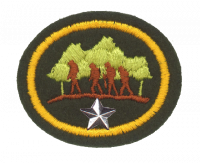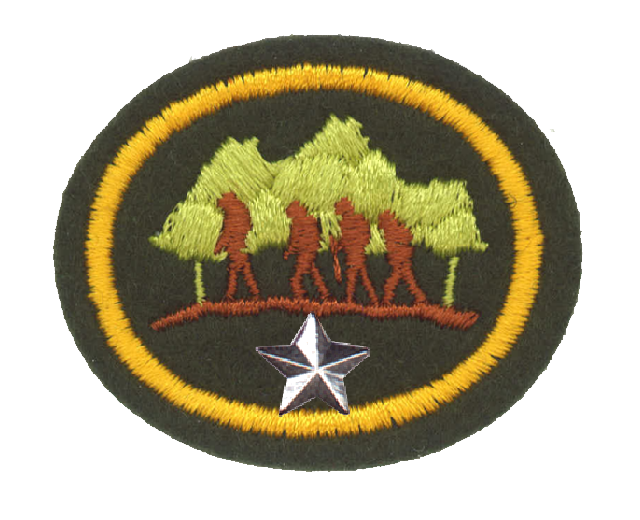Difference between revisions of "AY Honors/Outdoor Leadership - Advanced/Answer Key/es"
(Created page with "<noinclude>") |
(Created page with "</noinclude> <!-- 11a. Físico -->") |
||
| Line 275: | Line 275: | ||
{{ansreq|page={{#titleparts:{{PAGENAME}}|2|1}}|num=11a}} | {{ansreq|page={{#titleparts:{{PAGENAME}}|2|1}}|num=11a}} | ||
| − | <noinclude> | + | <noinclude></noinclude> |
| − | </noinclude> | + | <!-- 11a. Físico --> |
| − | <!-- 11a. | ||
| − | |||
<div lang="en" dir="ltr" class="mw-content-ltr"> | <div lang="en" dir="ltr" class="mw-content-ltr"> | ||
Revision as of 15:46, 28 March 2021
Nivel de destreza
3
Año
1986
Version
13.02.2026
Autoridad de aprobación
Asociación General
1
Para consejos e instrucciones, véase Liderazgo al aire libre.
2
Siete de cualquiera de estas especialidades pueden ser usadas para desarrollar la Maestría de Vida Primitiva.
3
Para consejos e instrucciones, véase Primeros auxilios II.
Para consejos e instrucciones, véase Reanimación cardiopulmonar (RCP).
3a
3b
3c
3d
3e
3f
3g
3h
4
Elegir un tema para cada uno de los siete cultos es más fácil si el viaje de campamento tiene un tema. Si no tiene un tema, podría elegir un tema para el culto usted mismo.
Tendrá que seleccionar siete momentos cuando tendrá la atención de los campistas. Aquí hay algunas sugerencias:
- Un programa de vespertinos viernes por la noche, entrando al sábado (alrededor de la fogata)
- En la mañana del sábado antes del desayuno
- En la escuela sabática
- Servicio de iglesia
- Caminata por la tarde (durante un período de descanso)
- Sábado por la noche, entrando al domingo (alrededor de la fogata)
- Domingo por la mañana antes del desayuno
Si las horas de la escuela sabática y/o el culto de adoración no están disponibles, puede usar el tiempo antes del almuerzo el sábado así como el tiempo antes de la cena. Otros intervalos de tiempo también son no sólo aceptables, sino bastante factibles. Lo importante es averiguar «cuándo» dará su mensaje y luego «seguir su plan».
Un guion debe consistir en un título, un punto principal, evidencia que apoya (que podría ser una historia o dos, con una de ellas sacadas del ambiente natural en el que usted está acampado), un texto bíblico y una reafirmación del punto principal. Se puede escribir en una sola hoja de papel o en una serie de tarjetas índice. Puede consultar el guion durante su mensaje. Mantenga el guion breve. Su meta principal es recordarle a usted que transmita los puntos que ya haya elegido. No es un guion para que lo lea a los otros campistas.
5
Las historias personales relatadas por la persona que las experimentó pueden ser un testimonio poderoso y conmovedor. Busque en su «banco de historias» una que crea que tiene la mejor oportunidad de llegar a su audiencia. Luego, decida cuál será la lección de esa historia. Una historia sin sentido no es más que entretenimiento. Su objetivo aquí es llegar a una persona, por lo que su historia debe tener una moraleja para transmitir un mensaje.
Resumir la historia significa escribir los aspectos más destacados.
- ¿Qué pasó?
- ¿Cómo empezó la situación?
- ¿Qué situación se desarrolló?
- ¿Cómo se resolvió?
- ¿Cómo intervino Dios?
- ¿Cómo afectó su vida?
- ¿Cómo sería diferente su vida si Dios no hubiera intervenido en su favor?
- ¿Qué aprendió de la experiencia?
6
La redacción de este requisito implica que usted está con la persona que se perdió o está en contacto de voz con ella (por radio o teléfono celular). En cualquier caso, puede tener influencia y calmarlos.
Primeramente, mantenga la calma. Esto no significa que ignore la gravedad de la situación, sino que la maneje de manera tranquila y deliberada. Empiece con una oración. Si la persona comienza a entrar en pánico y a actuar de manera irracional, dígale que se calme. Si está presente, es posible que deba restringir físicamente a una persona para evitar que se escape o se lastime.
Durante el contacto por hora, pregunte cómo está la persona y si ha visto algún punto de referencia que pueda identificar. Ayúdelos a resolver sus problemas a medida que surjan y describa el progreso del equipo de búsqueda y rescate. Ore de nuevo.
7
Recopilar información
Este ejercicio requerirá un mapa topográfico que cubra el área de búsqueda. Antes de que comience la búsqueda, hay varios pedazos de información que deben recopilarse y analizarse cuidadosamente.
- Estadísticas básicas acerca de la persona perdida:
- edad
- sexo
- constitución
- altura
- peso
- habilidad en la naturaleza
- último estado emocional conocido
- ¿Cuál fue la última ubicación conocida de la persona perdida?
- ¿Qué estaba usando la persona? Reúna tantos detalles como sea posible, incluyendo la ropa interior (las personas perdidas tienen una propensión asombrosa a deshacerse de las prendas).
- ¿Qué tipo de calzado estaba usando la persona?
- ¿Cuán bien equipada estaba la persona?
8
9
Consulte el requisito 2 para conocer las especialidades incluidas en la Maestría de Vida Primitiva.
10
10a
10b
10c
10d
Physical Emotional Mental Spiritual
11
Para esta discusión nos referiremos a los Conquistadores de 10 a 12 años como «menores» y a los Conquistadores de 13 a 16 años como «adolescentes». Se puede encontrar más información sobre este tema en el Manual del personal de Conquistadores.
11a
Juniors are generally a very healthy group of kids, and they are very active. They need to move, so a good Pathfinder program will have "moving" times built in to it (Marching and Drilling, games, etc.) to harness that energy productively.
Teens are very concerned about their appearance. They will often engage in innocuous physical contact with a certain girl or boy of whom they harbor romantic thoughts. This may include "slugging" them on the shoulder or lightly pushing them.
The teenage years are a time of rapid growth. The mind may still say that their shoe size is 7 when 11 is more like it. This can cause clumsiness and lead to embarrassment.
11b
Juniors remember almost everything you say. If you say "next week we are going to go on a nature hike," you had better go on a nature hike next week. If you do not, they will remind you of what you said. Be very careful of the things you promise to them, and never make a threat you are not willing to execute. If you get in a situation where consequences are called for, it is better to say "there will be consequences for that" and decide what those consequences are later rather than making a spur-of-the-moment threat that you will regret later.
Furthermore, juniors will remember what the consequences for a given infraction were for Johnny, the consequences for the same infraction had better be about the same for Billy. They recognize and remember unfairness.
Teens will continue to love and follow the adults in their lives that they loved and followed as juniors. If you become their "hero" when they are 12, they will still respect you when they are 16.
The teen years are an emotional roller coaster. Their bodies are coursing with hormones that make them very moody. One can easily be on the top of the moon at the beginning of an activity and an emotional mess before it's over. Girls tend to cry and get it all out (especially with trusted girlfriends), while boys tend to internalize negative emotions that can erupt at the slightest provocation.
Teens will sometimes challenge your authority. This will sometimes come in the form of the Pathfinder uniform. If a teen shows up for Induction with pink shoes instead of the regulation black, call them on it. If you do not, they may very well show up in baggy pants at the next Class A uniform event. You do not need to make a big scene - just let them know that you did notice and that their choice is not in line with your expectations.
11c
Junior Pathfinders love to collect things - it could be anything from the traditional stamps and coins to the more bizarre. Many AY honors involve making collections (Insects, Shells, Rocks and Minerals, etc.) so use this to your advantage.
Juniors are eager to learn and can memorize things quickly. They like to read.
Juniors are into "secret codes" and handshakes. They like adventure, and they love stories. Be careful when telling them the exploits of your own youth. If you ever tell them about the wrong things you did as a child, make sure you tell them what the consequences were as well. Also remember that they may try to reproduce your youthful adventures.
It is important that when you teach hands-on activities to this age group that it is their hands that are on, and not yours. If you jump in and do their activities for them, they will quickly lose interest. Instruct them how to do something, but then put your hands behind your back. Let them do it!
Logic plays a large role in a teen's thinking, as it is at this age that they become critical thinkers. They will compare what you say to what you do and note any inconsistencies.
If teens were cars, they would have excellent acceleration and lousy brakes. They may think of an idea and dive in before thinking of the consequences. If they do consider the consequences before it is too late, they may still have difficulty putting on the brakes. If they know that a well-loved adult leader (hopefully this is you) will be disappointed in their actions, that is sometimes enough to kick in the brakes. If they respect you, they do want your approval.
11d
Juniors are very interested in what goes on in church. They are eager to help take up the offering in church. Most baptisms in the Adventist church take place among this age group.
Do not discuss negatives in front of this age group. If there are problems in your club that require discussion with other staff, save them for staff meetings. Juniors will pick up on bad vibes, and if you complain about another staff member in front of them, you will undermine that staff's authority with them.
Juniors will take your word as authoritative on spiritual matters. Teens will challenge you, citing objections or inconsistencies.
Teens will wrestle with their consciences, but remember - their braking system is not yet fully developed. They do succumb to peer pressure, but they also repent. Be ready to forgive them, and remember that if they already realize they have made a mistake, a lecture may be unnecessary. Sometimes they just need a friend.
12
13
13a
13b
13c
13d
13e
Referencias
- Pages using DynamicPageList3 parser function
- AY Honors/Prerequisite/Outdoor Leadership/es
- AY Honors/See Also/Outdoor Leadership/es
- Adventist Youth Honors Answer Book/Prerequisite/Backpacking/es
- Adventist Youth Honors Answer Book/Prerequisite/Camp Craft/es
- Adventist Youth Honors Answer Book/Prerequisite/Camping Skills IV/es
- Adventist Youth Honors Answer Book/Prerequisite/Edible Wild Plants/es
- Adventist Youth Honors Answer Book/Prerequisite/Fire Building & Camp Cookery/es
- Adventist Youth Honors Answer Book/Prerequisite/Hiking/es
- Adventist Youth Honors Answer Book/Prerequisite/Knot Tying/es
- Adventist Youth Honors Answer Book/Prerequisite/Orienteering/es
- Adventist Youth Honors Answer Book/Prerequisite/Outdoor Leadership/es
- Adventist Youth Honors Answer Book/Prerequisite/Pioneering/es
- Adventist Youth Honors Answer Book/Prerequisite/Wilderness Leadership/es
- Adventist Youth Honors Answer Book/Prerequisite/Wilderness Living/es
- Adventist Youth Honors Answer Book/Prerequisite/Winter Camping/es
- AY Honors/Prerequisite/First Aid, Standard/es
- AY Honors/See Also/First Aid, Standard/es
- AY Honors/Prerequisite/CPR/es
- AY Honors/See Also/CPR/es
- Adventist Youth Honors Answer Book/es
- Missing Localization/All/Outdoor Leadership Advanced AY Honor.png/es


